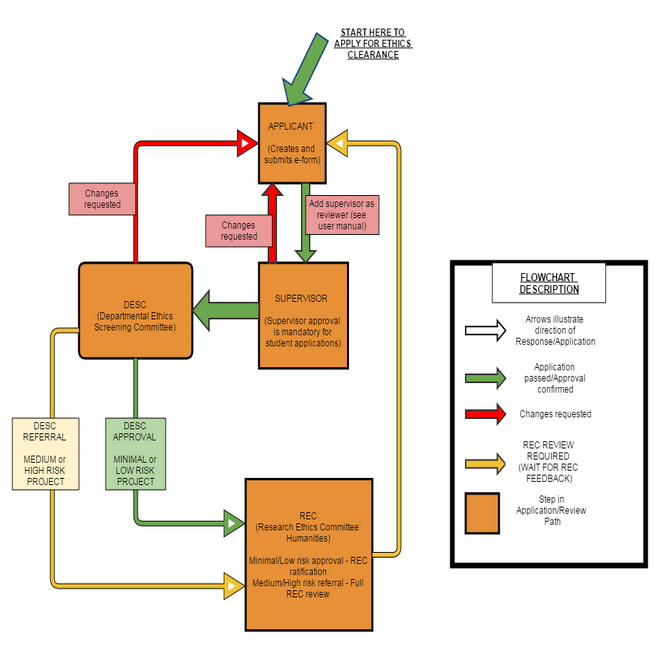
According to the Policy for Responsible Research Conduct at Stellenbosch University all research at Stellenbosch University involving interaction with or observation of human subjects, or information linked to human subjects, or research involving groups of individuals, or organisations must go through a process of ethical screening and clearance. Researchers are responsible for ensuring that they obtain ethics approval for their research where applicable from the Research Ethics Committee (Humanities). If an investigator (students included) is unsure if ethics approval is required for a specific project, it is the responsibility of that investigator to seek and obtain clarification from the Division for Research Development [cgraham@sun.ac.za].
The ethics application process starts within respective Departments via the Departmental Ethics Screening Committee (DESC). The Research Ethics Committee: Humanities uses an electronic ethics application process hosted by the RIMS InfoEd system. Access to the RIMS InfoEd application system can be obtained via the link https://su.rims.ac.za. Assistance in the form of manuals and are available via the Division of Research Development website [http://www0.sun.ac.za/research/research-integrity-and-ethics/human-research-humanities-ethics-1/electronic-application-process.html]. A list of documents for ethics review provides guidance regarding the documents that should be attached to ensure a thorough and timely review of an ethics application. Copies of the informed consent form
template or assent form template are available from the website of the Division for Research Development. The consent form is prepared for the participant as written agreement to participate in the research study. An alternative consent formulation is also available. Please click here for the alternative consent form template. The informed assent form is prepared for a child's affirmative agreement to participate in research.
Applications are first screened by the DESC to determine their risk levels. Applications of minimal and low risk are screened by the DESC and are ratified the REC. Only applications with medium to high ethics risks are referred to the REC for full review. The following flowchart illustrates and summarises the ethics application process:

The responsibility to conduct ethically responsible research lies in the first place with the researcher, supervisor and departmental chair. The researcher is required to develop an ethical orientation and internalisation of ethical principles and practices in research, rather than defer this responsibility to the Research Ethics Committee. This internalised ethical orientation should guide the researcher in every step of the research, instead of following a mechanistic, checklist or blueprint approach to the ethics of research. To assist the researcher in reflecting on the ethical risks associated with his/her research the REC developed and published a booklet entitled Research Ethics Guidelines: Getting ethics approval for your research project that provides useful tips and relevant information on research ethics and the ethics application process.
The Research Ethics Guidelines is supplementary to the Standard Operating Procedures. The Standard Operating Procedure (SOP). The overarching objective of the SOP is to promote a culture of ethically responsible research at Stellenbosch University in the social, behavioural, economic and educational sciences. The SOP describes the substantive and procedural aspects relevant to the reviewing the ethical risks associated with social, behavioural, economic and educational research conducted at Stellenbosch University.

